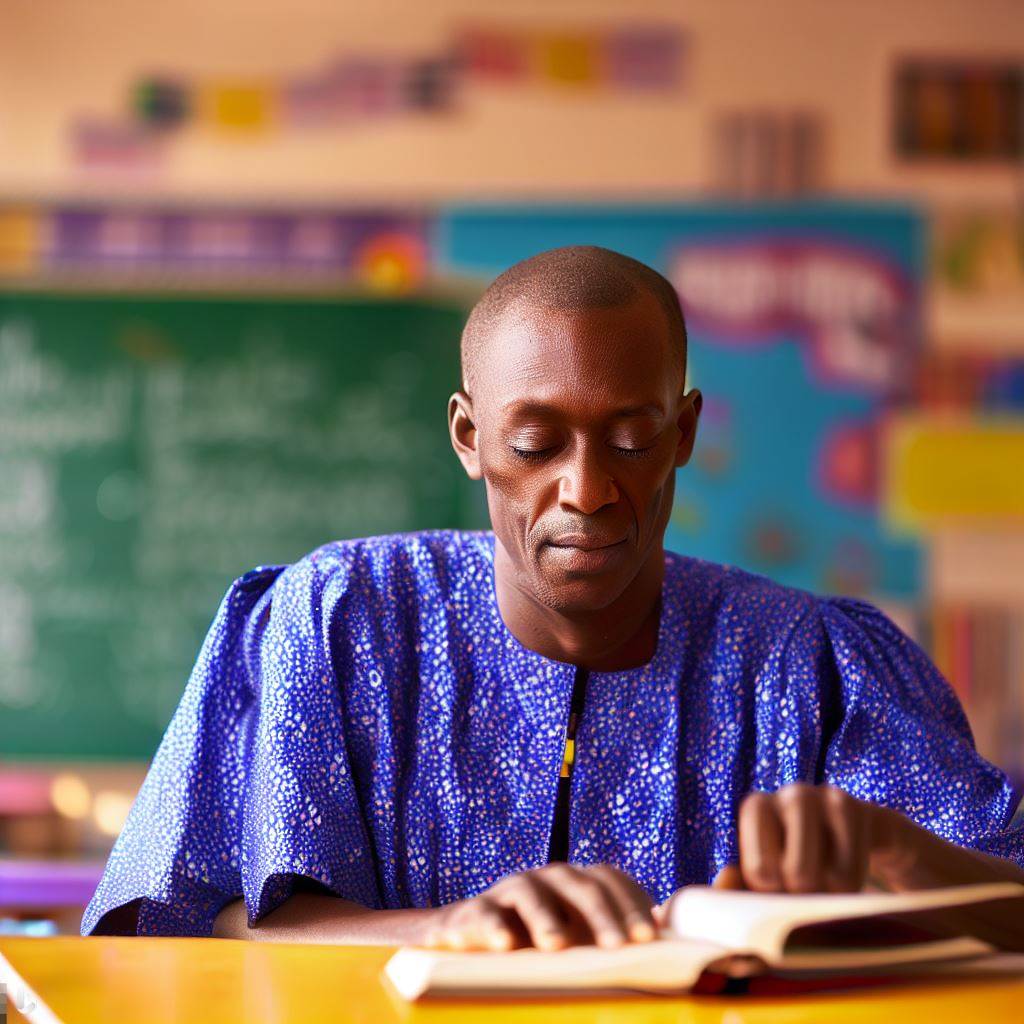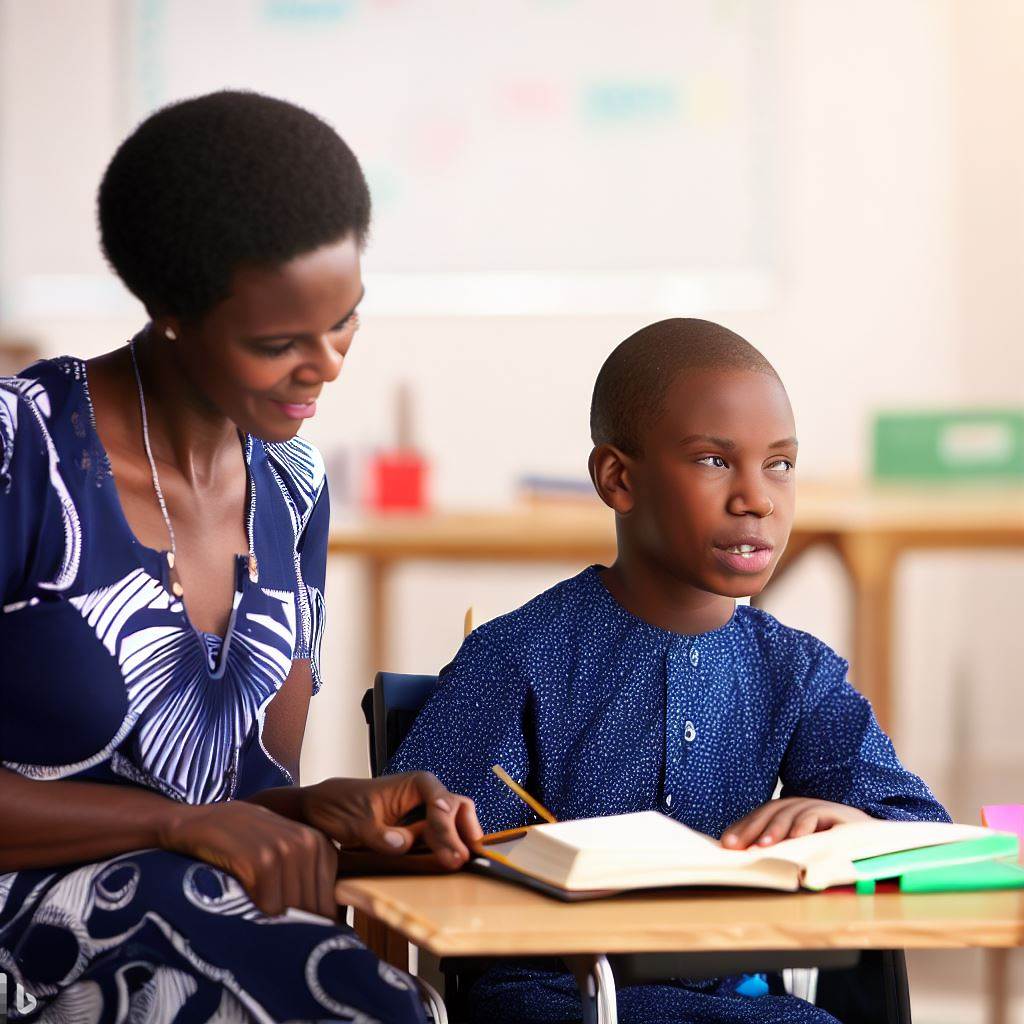Introduction
In Nigeria, special education refers to the academic support provided to students with diverse learning needs.
Special education teachers play a crucial role in this field, ensuring that every child receives an inclusive education.
These educators are highly trained professionals who possess the skills and knowledge necessary to support students with disabilities in their daily lives.
Special education in Nigeria is vital because it promotes equal access to education for all students, regardless of their abilities or disabilities.
It seeks to address the unique needs of individuals with disabilities and provide them with the necessary support and accommodations.
Special education teachers in Nigeria often work in specialized schools or integrated classrooms, where they collaborate with other professionals to create individualized education plans (IEPs) for each student.
These plans outline specific goals, accommodations, and modifications to ensure that students receive the appropriate education and support.
The daily life of a special education teacher in Nigeria is diverse and demanding. They assess students’ abilities, develop instructional strategies, and provide individualized support during classroom activities.
These teachers also collaborate with parents, regular education teachers, and other professionals, such as speech therapists and occupational therapists, to ensure a holistic approach to education.
Furthermore, special education teachers in Nigeria attend meetings and workshops to enhance their professional development.
They stay up-to-date with the latest research and best practices in the field to better serve their students.
In conclusion, special education teachers in Nigeria play a significant role in ensuring that students with disabilities receive the necessary support and inclusive education.
Their daily life involves planning, collaboration, and continuous professional growth to provide the best possible learning experience for their students.
Roles and Responsibilities of a Special Education Teacher
In Nigeria, special education teachers play a crucial role in the lives of students with special needs.
These dedicated professionals undertake various responsibilities and tasks to ensure that their students receive quality education and support.
Let’s delve into the key roles and responsibilities of a special education teacher:
A. Teaching academic subjects to students with special needs
A primary responsibility of a special education teacher is to teach academic subjects to students with special needs.
They work closely with these students, employing effective teaching strategies to facilitate their understanding and learning.
Through individualized instruction, they adapt the curriculum to meet each student’s unique needs.
B. Developing individualized education plans (IEPs) for each student
To address the specific needs of their students, special education teachers develop individualized education plans (IEPs).
These plans outline the student’s learning goals, accommodations, and modifications required to meet those goals.
The IEPs serve as roadmaps, ensuring that every student’s educational journey is personalized and successful.
C. Collaborating with other professionals and parents
Special education teachers understand the importance of collaboration in providing holistic support to their students.
They work closely with other professionals such as speech therapists, occupational therapists, and psychologists to ensure comprehensive care.
They also maintain regular communication with parents, updating them on their child’s progress and involving them in decision-making processes.
D. Providing emotional and behavioral support
Special education teachers recognize the emotional and behavioral challenges that students with special needs may face.
They create a safe and inclusive learning environment, offering guidance and support to help students develop appropriate social and emotional skills.
They implement behavior management strategies, fostering positive behavior and addressing any issues that arise.
E. Adapting and modifying teaching strategies and materials
To cater to the diverse learning needs of their students, special education teachers adapt and modify teaching strategies and materials.
They employ various instructional techniques, including visual aids, manipulatives, and multisensory approaches, to engage students and facilitate their comprehension.
This flexibility ensures that each student can access and participate in the learning process effectively.
As these responsibilities show, special education teachers in Nigeria work tirelessly to provide quality education and support to students with special needs.
Their passion for helping students overcome challenges and reach their full potential is commendable.
Read: A Comprehensive Overview of Special Education in Nigeria
A Day in the Life of a Special Education Teacher
- Morning Routine and Preparation for the Day: The alarm buzzes, and I wake up early to begin my day as a special education teacher in Nigeria. I complete my morning routine, getting ready for the day ahead.
- Conducting Assessments and Evaluations: Once I arrive at the school, I start by conducting assessments and evaluations for my students. This helps me understand their individual needs and strengths.
- Planning and Delivering Lessons Based on IEPs: With the assessments in hand, I meticulously plan and prepare my lessons based on Individualized Education Programs (IEPs). I tailor each lesson to suit the unique requirements of each student.
- Providing One-on-One or Small-Group Instruction: Throughout the day, I provide one-on-one or small-group instruction to my students. This allows me to give them the individualized attention they need to succeed academically.
- Monitoring Student Progress and Adjusting Instruction Accordingly: As the day progresses, I continuously monitor my students’ progress. This helps me identify any areas where they may be struggling and enables me to adjust my teaching methods accordingly.
- Collaborating with Other Teachers and Support Staff: Collaboration is crucial in special education, so I regularly meet and communicate with other teachers and support staff. We discuss strategies, share resources, and work together to meet the diverse needs of our students.
- Attending Meetings and Parent Conferences: In addition to my teaching responsibilities, I attend meetings and parent conferences.
These gatherings provide opportunities to discuss and develop plans for the academic and personal growth of my students. - Grading Assignments and Providing Feedback: At the end of the day, I review and grade assignments. I provide detailed feedback to each student, emphasizing their strengths while offering constructive suggestions for improvement.
Each day brings new challenges and opportunities for growth, but the reward of witnessing my students’ progress is immeasurable.
I am grateful for the chance to support and empower these incredible children, helping them reach their full potential and achieve their dreams.
Read: Continuing Education for Health Educators in Nigeria: A Guide

Challenges Faced by Special Education Teachers in Nigeria
A. Limited resources and funding for special education programs
Special education teachers in Nigeria often struggle with inadequate resources to support their students.
Funding for special education programs is limited, resulting in a lack of essential tools and materials.
This shortage hinders the ability of teachers to provide comprehensive and effective education for students with special needs.
B. Inadequate training and professional development opportunities
Special education teachers in Nigeria often face a lack of training and professional development opportunities.
This limits their ability to acquire the necessary skills and knowledge to effectively teach students with special needs.
Without proper training, teachers may struggle to implement appropriate teaching strategies and interventions.
C. Overcrowded classrooms and lack of adequate space
Special education classrooms in Nigeria are often overcrowded, making it challenging for teachers to provide individualized attention.
The lack of adequate space hampers effective teaching and limits the implementation of specialized teaching methods.
Large class sizes also make it difficult for teachers to address the diverse needs of their students.
D. Limited parent involvement and support
Parent involvement and support play crucial roles in the success of special education programs.
In Nigeria, however, many parents of children with special needs are unaware of their rights and the importance of active involvement.
This lack of engagement hinders collaboration between teachers and parents, impacting the overall effectiveness of education.
E. Social stigma and discrimination towards students with special needs
Students with special needs in Nigeria often face social stigma and discrimination. These societal biases create barriers to inclusion and can negatively affect the self-esteem and well-being of students.
Special education teachers must work tirelessly to foster a more inclusive and accepting environment for their students.
In fact, special education teachers in Nigeria encounter a range of challenges in their daily lives.
Limited resources and funding, inadequate training and professional development opportunities, overcrowded classrooms, limited parent involvement and support, and social stigma and discrimination all impact the education and well-being of students with special needs.
Despite these difficulties, dedicated special education teachers strive to overcome these obstacles and provide the best possible education for their students.
Read: Addressing Cultural Sensitivity as a Health Educator in Nigeria
Rewards and Fulfillment as a Special Education Teacher
A. Making a Meaningful Difference in Students’ Lives
As a special education teacher in Nigeria, one of the greatest rewards is the opportunity to make a meaningful difference in the lives of students with special needs.
By providing personalized instruction and support, I can help my students overcome their challenges and reach their full potential.
Seeing the progress they make, both academically and socially, brings me a deep sense of fulfillment and satisfaction.
B. Witnessing Progress and Achievements of Students
Another rewarding aspect of being a special education teacher is witnessing the progress and achievements of my students.
Every small milestone they reach, such as learning to read or improving their communication skills, is a cause for celebration.
Seeing their confidence grow and witnessing their joy when they succeed is truly inspiring and reminds me why I chose this profession.
Read: Insights into the Teaching Profession in Nigeria Today
C. Building Strong Relationships with Students, Parents, and Colleagues
Building strong relationships with my students, their parents, and my colleagues is an essential part of my job as a special education teacher.
Developing a rapport with my students allows me to better understand their individual needs and tailor my teaching to meet those needs effectively.
Working closely with parents enables us to collaborate in supporting the child’s development and academic progress.
Furthermore, being part of a supportive team of special education professionals creates a positive and motivating work environment.
D. Contributing to the Development of Inclusive Education in Nigeria
One of the most fulfilling aspects of being a special education teacher in Nigeria is contributing to the development of inclusive education in the country.
By promoting the importance of inclusivity and advocating for equal opportunities for all students, regardless of their abilities, I can help shape the future of education in Nigeria.
Being a part of this transformative movement gives me a sense of pride and fulfillment, knowing that I am making a lasting impact on education in my country.
In essence, being a special education teacher in Nigeria comes with numerous rewards and fulfillment.
From making a meaningful difference in students’ lives to witnessing their progress and achievements, the job is incredibly gratifying.
Building strong relationships with students, parents, and colleagues enhances the overall learning experience.
Furthermore, contributing to the development of inclusive education in Nigeria allows teachers to shape the future of education in the country.
Overall, the rewards and fulfillment of being a special education teacher make it a truly meaningful and important profession.
Read: Interviews: Health Educators Discuss Their Experiences in Nigeria
Discover More: Nigeria’s Professorship Journey: From PhD to Full Professor
Conclusion
A. Recap of the daily life and challenges of a special education teacher in Nigeria
Being a special education teacher in Nigeria is no easy task. Every day, these educators face numerous challenges, such as lack of resources, inadequate training, and large class sizes.
Nevertheless, they are dedicated to providing quality education and support to their students with special needs.
They tirelessly work to create individualized educational plans, adapt teaching materials, and employ innovative instructional strategies to meet the diverse learning needs of their students.
Despite the obstacles, these teachers are committed to making a positive impact on the lives of their students and empowering them to reach their full potential.
B. Importance of supporting and recognizing the efforts of special education teachers
The work of special education teachers in Nigeria is invaluable, yet often unappreciated. It is crucial to support and recognize their tireless efforts in providing inclusive education for students with special needs.
These teachers play a vital role in promoting equal opportunities and ensuring the academic and personal growth of these students.
By acknowledging and appreciating the work of special education teachers, we can foster a supportive environment that encourages their professional development and overall wellbeing.
C. Call to action for enhanced support, resources, and training for special education in Nigeria
It is evident that special education in Nigeria requires significant improvement.
The government, educational institutions, and society as a whole must prioritize the enhancement of support, resources, and training for special education teachers.
Increased funding for special education programs, accessible professional development opportunities, and specialized training for teachers are essential for the development of inclusive educational environments.
Together, let us advocate for change and work towards a future where every child with special needs in Nigeria receives the quality education they deserve.
Publish Your Professional Profile, Business or Brand
Showcase your expertise, gain trust, and boost visibility instantly on Professions.ng.
Publish Now



